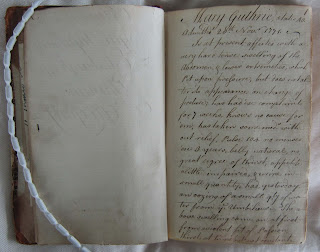It (finally!) seems to be summer time again. You’d think
that the sun would signal a quiet time in university archives – most of the students
are on their summer breaks and genealogists’ thoughts are perhaps turning more
to the lilo than lineage…. However, judging by the last few weeks at LHSA,
that’s not at all the case!
Summer time means that academics are released from their
teaching and finally have some time to do their research and postgraduates
enjoy the relative quiet of the campus outside semester time. They’re certainly
doing that in the Centre for Research Collections reading room, with this past week rarely seeing
a spare table on the sixth floor. LHSA readers, for example, are researching control
of infectious disease in the early twentieth century, late eighteenth and early
nineteenth century fever medicine, child psychiatry, public health policy in
Edinburgh and the relationship between physicians and patients at the Royal
Edinburgh Hospital.
To this end, we’ve been searching out items from the stores,
including items from our fascinating City of Edinburgh public health
collection:We’ve been finding copies of the Royal Edinburgh Hospital magazine, the Morningside Mirror, for a postgraduate researcher looking at the relationship between doctors and patients at the institution:
Pages from the Morningside Mirror (LHB7/13/5)
And we’re going to search out our oldest Royal Infirmary of Edinburgh case notes for our visitor researching early fever medicine….
Page from a volume from physician John Gregory, documenting cases from 1771 - 1772 (GD1/66)
… as well as polishing our collection of brass plaques to
help another researcher to investigate the history of modern infectious disease nursing:Bed plaque from LHSA hospital plaque collection (Q86)
In addition to these wider topics, academic researchers have also been looking more closely at individual lives. One reader found a trace of a literary academic and intelligence corps. officer as a patient in Craigleith Military Hospital during the First World War, and another searched inside the papers of the Edinburgh Society for the Relief of the Destitute Sick for a mention of ballads donated by James Bertram to Walter Scott and William Laidlaw:





No comments:
Post a Comment